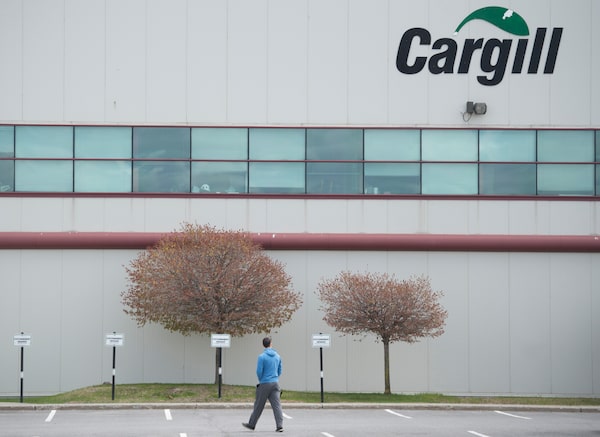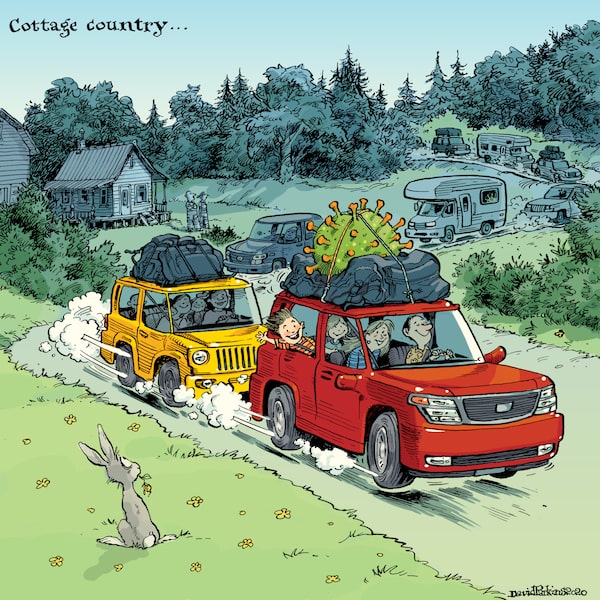Good morning,
Cargill Ltd. is suspending operations at its meat-packing plant near Montreal after more than 10 per cent of its work force tested positive for COVID-19, marking the company’s second shutdown in Canada because of the novel coronavirus.
The company on Sunday said it will “temporarily idle” its facility at Chambly, Que., after 64 employees tested positive. The closing comes one week after the global agribusiness reopened its slaughterhouse in High River, Alta., the site of the country’s largest outbreak. The plant was closed for two weeks because nearly half of its 2,000 employees had tested positive for the virus.

A man walks into a Cargill meat processing factory in Chambly, Que., south of Montreal, Sunday, May 10, 2020. The plant is closing temporarily after at least 64 workers tested positive for COVID-19. THE CANADIAN PRESS/Graham HughesGraham Hughes/The Canadian Press
This is the daily Morning Update newsletter. If you’re reading this on the web, or it was forwarded to you from someone else, you can sign up for Morning Update and more than 20 more Globe newsletters on our newsletter signup page.
Chinese couple who ‘sought a better life’ in Canada now jailed in China for defecting with state secrets
Peter Wang and Ruqin Zhao are Chinese-born engineers who worked in the Toronto area. They are described by a former manager as immigrants who sought a better life for their daughter when they came to Canada in 2002. The couple was arrested in 2017 on a return to China to visit relatives, according to state media reports.
Last month, Chinese state media said Mr. Wang and Ms. Zhao, both Canadian citizens, had become the first defection case disclosed by security authorities, after they were sentenced to prison in late 2019 – three years for Mr. Wang and two for Ms. Zhao. It’s not clear whether Ms. Zhao remains in prison, since it has been more than two years since her arrest.
As Quebec schools open, researchers tackle a big unknown: What role do children play in the spread of COVID-19?
The rate at which young children spread the coronavirus remains one of the big unanswered questions of the pandemic.
There is little doubt children are capable of transmitting the virus, but plenty of doubt about how often they actually do.
Figuring that out is taking on more urgency as several European countries tentatively reopen their schools and as Montreal – the hardest-hit city in Canada – looks to welcome children back on May 25.
Montreal epidemiologist Kate Zinszer needs an answer more than most.
Got a news tip that you’d like us to look into? E-mail us at tips@globeandmail.com Need to share documents securely? Reach out via SecureDrop
ALSO ON OUR RADAR
British PM Boris Johnson lays out road map for easing coronavirus lockdown
The Prime Minister outlined “the first sketch of a road map for reopening society.” Under the plan, people will be allowed to exercise more frequently outside their homes as of Wednesday and anyone working in construction or manufacturing will be encouraged to return to their jobs. Primary schools could open in June and by July Mr. Johnson said parts of the hospitality industry could reopen, along with some public places.
MORNING MARKETS
World stocks focus on easing lockdowns: Investors clung to signs that more countries were restarting their economies and looked past reports of a pick-up in new coronavirus cases. Just before 6 a.m. ET, Britain’s FTSE 100 was off 0.54 per cent. Germany’s DAX and France’s CAC 40 were down 0.43 per cent and 1.13 per cent, respectively. In Asia, Hong Kong’s Hang Seng rose 1.53 per cent. Japan’s Nikkei gained 1.05 per cent. New York futures were little changed. The Canadian dollar was trading at 71.65 US cents.
Looking for investing ideas? Check out The Globe’s weekly digest of the latest insights and analysis from the pros, stock tips, portfolio strategies and what investors need to know for the week ahead. This week’s edition includes five outperform picks, bank-stock buying strategy and a dividend play to sell.
WHAT EVERYONE’S TALKING ABOUT
Erin O’Toole could win the Conservative leadership race
John Ibbitson: “Had the vote been held a couple of months ago, Mr. MacKay would probably have won in the first round. The former Progressive Conservative leader and then senior cabinet minister in the Harper governments had the money, endorsements and name recognition to win in a walk. Today, not so much.”
Making history: How a pandemic took the world by surprise
Margaret MacMillan: “It is not too soon to start asking what we have learned. Why did COVID-19 spread so quickly? Why do some societies seem to be coping better than others? Did we overreact, or could we be doing more or different things? And what lasting effects will there be on the world?”
TODAY’S EDITORIAL CARTOON

David ParkinsDavid Parkins/The Globe and Mail
LIVING BETTER
With a scarcity of community gardens, this project is match-making landowners and green thumbs
Liberating Lawns, launched by Toronto resident Cheyenne Sundance, plays the role of matchmaker in connecting people who want to have a garden but don’t have the space with those who have the space but not the inclination.
Sundance has already hooked up five sets of prospective growers with homeowners. She’s also in the process of recruiting representatives in neighbourhoods across the city who will help identify willing partners. The gardeners get to grow organic produce; the property owners get part of the yield.
"[People] see long lines at grocery stores now and get scared,“ Sundance says. "There is a big demand and a heightened need for urban produce.”
MOMENT IN TIME:
CANADA-WIDE REUNION OF ADMIRERS TO HONOUR JACKSON AT ART GALLERY -- Famed member of Group of Seven, artist A.Y. Jackson (left), who pioneered realistic outdoor school of art in Canada, is seen October 15, 1953. Jackson finishes breakfast with Keith MacIver, mining prospector artist, in Tom Thomson shack behind Studio Building (25 Severn Street) in Toronto. The dog is MacIver's Dalmatian, named Peggy. Incidentially, Jackson will remind you that the art world owes a debt to MacIver for having restored the famous shack when it was on the point of falling down. Credit: The Globe and Mail (Neg. 53289-03) Originally published October 22, 1953The Globe and Mail
For more than 100 years, photographers have preserved an extraordinary collection of 20th-century news photography for The Globe and Mail. Every Monday, The Globe features one of these images. This month, we are looking at the Group of Seven.
This photo from 1953 shows the Canadian artist A.Y. Jackson (left) in Tom Thomson’s shack with his friend, the prospector Keith MacIver, who had repaired the structure. In 1914, artist Lawren Harris and art patron Dr. James McCallum had paid for the construction of the Studio Building, which still stands on the edge of the Rosedale Ravine in Toronto. In 1915, improvements were made to a tool shed behind the building so that the impecunious Thomson could move in there. He paid a dollar’s rent each month and lived in the shack in the winter. After his 1917 death, his colleagues went on to form the Group of Seven in 1920, and continued to use the shack for socializing and painting. The shack was purchased in 1962 and moved to the grounds of the McMichael Canadian Art Collection in Kleinburg, Ont., where it can still be visited.
If you’d like to receive this newsletter by e-mail every weekday morning, go here to sign up. If you have any feedback, send us a note.
 Jamie Ross
Jamie Ross